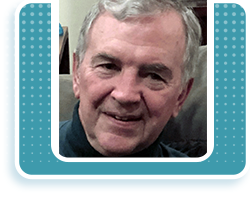
Loren L Latta, PhD
Professor Emeritus
Director
University of Miami, Department of Orthopaedics, Miami, FL
Max Biedermann Institute for Biomechanics, Mount Sinai Medical Center, Miami Beach, FL
How has AAOS helped you throughout your career?
AAOS Annual Meeting provides connections to people that we collaborate with regularly, as well as opportunities to meet new potential collaborators and friends. The posters, instructional courses and papers keep us on the cutting edge of Orthopaedics and help us learn how to improve our presentations and publications. AAOS poster sessions, paper presentations, and instructional courses provide opportunities to share our work with others. AAOS Journal, newsletters, and AAOS Now publications provide work we can cite that are current.
We also work with several of the Orthopaedic companies that manufacture devices, materials, and pharmaceuticals, publish books and journals, and provide services to surgeons. The AAOS meeting provides opportunities for us to make new contacts, update on their latest technologies, as well as to introduce us.
As an Allied Member, which AAOS resources do you use most and why?
I use the newsletters and attendance at Annual Meetings to keep in touch with members as well as others involved in current research. The courses I have attended have kept me up to date on new ideas, and new developments. Presenting at courses, workshops, and exhibits has helped me to meet new folks and establish lasting relationships with other surgeons and researchers.
What’s the best advice you were ever given Who was it from?
The best advice I received was from Augusto Sarmiento who said that in everything you say and do always be honest and ethical. Frequently question your own beliefs and understandings. Check their validity against basic fundamentals. This will make sure you are headed in the right direction or change course if a new direction is necessary.
What’s your go-to productivity trick?
Since I do research, I always need to have several things going on because there will always be unexpected delays in most projects. So I keep several things to catch up on during unscheduled downtimes.
For example: ASTM/ISO testing standards are voluntary, non-funded work. During some downtime, we ran a test that was essential to developing a standard test for the mechanics of intramedullary nails. Conventional testing methods were not accurate. That method was adopted as the standard for ASTM and ISO.
What’s one thing you’re currently trying to make a habit?
Step back and let the younger people take over. Try to mix the students with the faculty and residents who can help them shape their career goals.
What hobbies do you enjoy in your spare time?
Snorkeling, wildlife photography, collecting antique model trains and railroad memorabilia, and attending college football games.
Tell us a fun fact about yourself that not many people know?
I started working in an Orthopaedics Co. in 1967. I left and went to work for the Atomic Energy Commission in 1969-70. It was fun, cutting-edge technology, but for destructive purposes, (nuclear weapons). I wanted to help people, not destroy people. So I went back to Orthopaedics industry in 1971 before moving to the Department of Orthopaedics and Rehabilitation at UM in 1972.